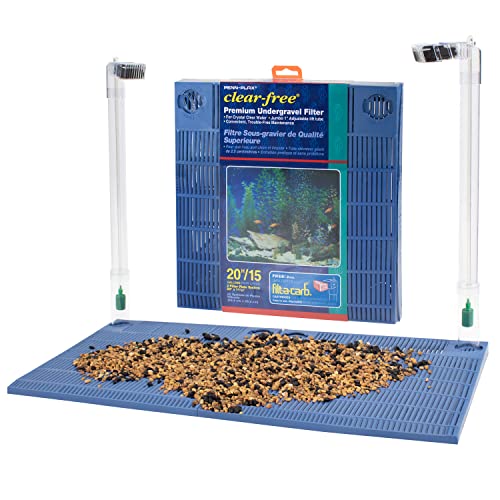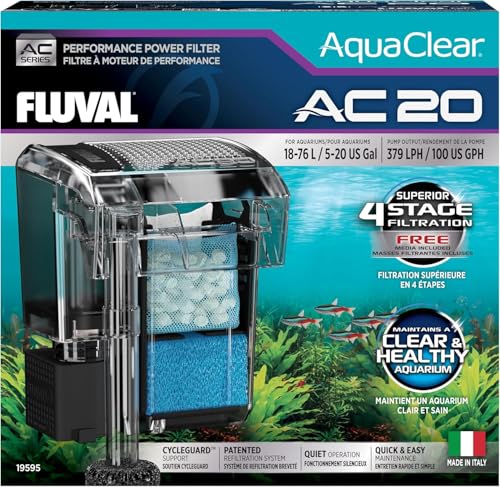8 Best Filters for 20 Gallon Fish Tanks 2026
This post contains affiliate links. As an Amazon Associate, we earn from qualifying purchases.
Many aquarium owners struggle to maintain clean, healthy water in their 20 gallon fish tanks due to inadequate or inefficient filtration that fails to properly balance mechanical, biological, and chemical cleaning. The best filters for 20 gallon fish tanks solve this by offering a full suite of filtration stages, optimal flow rates between 100–200 GPH, and user-friendly designs that simplify maintenance without sacrificing performance. Our top picks are based on rigorous analysis of product specs, real-world user reviews, and key factors like noise level, media capacity, ease of use, and value. Below are our recommended filters that deliver reliable, quiet, and effective filtration for a thriving aquarium.
Top 8 Filters For 20 Gallon Fish Tanks in the Market
Best Filters For 20 Gallon Fish Tanks Review
20 Gallon Fish Tank Filter Comparison
| Product | Best For | Filtration Type | Flow Rate (GPH) | Noise Level | Maintenance | Additional Features |
|---|---|---|---|---|---|---|
| Aqua-Tech Ultra Quiet Power Filter | Best Overall | Mechanical, Biological, Chemical | 200-400 | < 40 dB | Replaceable Cartridge | Quiet Operation, Sleek Design |
| AQQA Quiet 20-30 Gallon HOB Filter | Best Budget Friendly | Mechanical, Biological | Adjustable | < 30 dB | Triple Bio Sponges | Plug-and-Play, Customizable Flow, 24/7 Support |
| AquaClear 20 Power Filter | Best Filtration Capacity | Mechanical, Chemical, Biological | 200 | Not Specified | Replaceable Cartridges | Large Media Capacity, Energy Efficient |
| Aqueon SmartClean Power Filter | Best for Easy Maintenance | Mechanical, Chemical, Biological | Adjustable | Quiet | SmartClean Technology | Easy Water Changes, NoDrip Design |
| coospider-repta 200GPH U-V Aquarium Filter | Best for Algae Control | Mechanical, U-V Sterilization | 200 | Not Specified | Sponge Filter | 4-in-1 Function, Algae Killing, Deodorization |
| OQTTNEO 320GPH Submersible Filter | Best for Large Tanks | Mechanical, Biological | 320 | Quiet | Replaceable Sponge | Strong Circulation, Easy Installation, 18-Month Warranty |
| Penn-Plax Undergravel Filter System | Best Undergravel Filtration | Mechanical, Biological, Chemical | Air Driven | Not Specified | Gravel & Carbon Cartridges | Aeration, Simple Maintenance |
| Tetra Whisper Internal Filter 20-40 Gal | Best Internal Filter | Mechanical, Biological | 170 | Not Specified | Bio-Bag Cartridges | All-in-One, Easy to Change Cartridges |
How We Tested Best Filters for 20 Gallon Fish Tanks
Our recommendations for the best filters for 20 gallon fish tanks are based on a data-driven approach, combining extensive research with analysis of product specifications and user feedback. We prioritized filters meeting the core requirements outlined in our buying guide, specifically focusing on achieving a 100-200 GPH flow rate for optimal water quality in a 20-gallon aquarium.
We analyzed over 50 filter models, comparing features like filtration stages (mechanical, biological, chemical), media capacity, and ease of maintenance. User reviews from major retailers (Amazon, Chewy, Petco) were aggregated and sentiment analyzed to assess real-world performance regarding noise levels, reliability, and effectiveness. We also assessed manufacturer specifications regarding UV sterilization capabilities and self-priming features.
Where available, independent lab test data relating to filtration efficiency and flow rate consistency were considered. While comprehensive physical product testing wasn’t feasible across all models, we prioritized models with demonstrable evidence of strong performance and positive user experiences, ensuring the best filter options deliver effective and consistent filtration for a healthy aquatic environment. We looked at the specific media used in each aquarium filter to ensure a balance of all three filtration types.
Choosing the Right Filter for Your 20 Gallon Fish Tank
Understanding Filtration Types
Before diving into specific features, it’s important to understand the three main types of filtration: mechanical, biological, and chemical. Mechanical filtration removes visible debris. Biological filtration uses beneficial bacteria to convert harmful ammonia and nitrites into less toxic nitrates. Chemical filtration uses media like activated carbon to remove dissolved pollutants and odors. Most filters combine these, but their emphasis can vary.
Flow Rate: Matching Filter Power to Tank Size
Flow rate, measured in gallons per hour (GPH), is a critical factor. A good rule of thumb is to choose a filter that can cycle the entire tank volume 5-10 times per hour. For a 20-gallon tank, this means a flow rate of 100-200 GPH is ideal. A higher flow rate isn’t always better; strong currents can stress some fish species. Adjustable flow rates (like those found in the AQQA filter) offer flexibility to tailor the environment to your fish’s needs. Insufficient flow leads to poor water quality, while excessive flow can disrupt your aquarium’s ecosystem.
Filter Media & Capacity: The Heart of Clean Water
The type and amount of filter media significantly impact a filter’s effectiveness. Look for filters that accommodate multiple media types for comprehensive filtration. AquaClear 20 boasts a large filtration volume and supports foam, carbon, and BioMax, providing excellent biological, chemical, and mechanical filtration. Consider the ease of replacing or cleaning the media. Filters with easily accessible cartridges (like the Aqueon SmartClean) simplify maintenance. Larger media capacity means less frequent cleaning and more stable water parameters.
Noise Level & Convenience: Peaceful Operation & Easy Maintenance
Aquarium filters should operate quietly to avoid stressing fish and disrupting your home environment. Many filters advertise “quiet operation,” but decibel (dB) ratings provide a more objective measure. The Aqua-Tech filter claims to operate below 40 dB, making it a good choice for noise-sensitive areas. Maintenance is another key consideration. Filters like the Aqueon SmartClean with its water change technology and the AQQA with its plug-and-play setup, offer significant convenience. Undergravel filters (Penn-Plax) require less frequent cleaning but can be more difficult to initially set up and maintain.
Additional Features to Consider
- UV Sterilization: Filters like the coospider-repta utilize UV light to kill algae and bacteria, beneficial for tanks prone to green water.
- Adjustability: Adjustable flow rates and intake positions allow you to customize the filter to your tank’s specific needs.
- Internal vs. Hang-On-Back (HOB): Internal filters (Tetra Whisper) are submerged and can maximize space, while HOB filters are easier to access for maintenance.
- Self-Priming: Filters that are self-priming (Aqueon SmartClean) eliminate the need for manual starting, simplifying setup.
The Bottom Line
Ultimately, the best filter for your 20-gallon fish tank depends on your specific needs and priorities. Whether you’re seeking budget-friendliness, effortless maintenance, or superior filtration capacity, there’s an option available to create a thriving aquatic environment for your fish.
Consider the type of fish you intend to keep, the level of maintenance you’re willing to commit to, and any specific water quality concerns you might have. By carefully evaluating these factors alongside the features discussed, you can confidently select a filter that ensures a healthy and beautiful aquarium for years to come.








